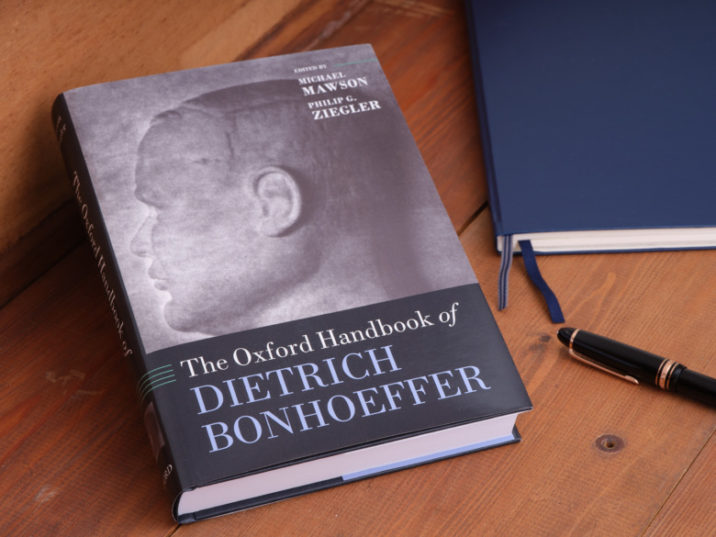The Oxford University Press Handbooks are renowned as go-to volumes for students and scholars alike when embarking on research in new topics, or for seasoned scholars who want to know the essential bibliographies for any number of issues in biblical and religious studies.
The third interview in our series is with both the Rev’d Professor Philip Ziegler, Chair of Christian Dogmatics, School of Divinity, History & Philosophy at the University of Aberdeen, and Michael Mawson, Senior Lecturer in Systematic Theology and Ethics at the United Theological College and Charles Sturt University, co-editors of The Oxford Handbook of Dietrich Bonhoeffer.

What is special about the OUP Handbooks, and why should students and scholars use them in their research?
The OUP Handbooks are a fantastic resource for students and scholars needing to negotiate increasingly complex and large bodies of primary and secondary literature on a variety of topics. They are all organised in ways that provide maps of important topics and areas, as well as directing readers to other resources and materials. They are intended to represent the current “state of the art” discussion their subject and be a first port of call for those taking up study and research.

Tell us a bit about what you both wished to accomplish as editors of The Oxford Handbook of Dietrich Bonhoeffer and how you think that goal was achieved.
The Oxford Handbook of Dietrich Bonhoeffer is in many ways downstream from the completion of the Dietrich Bonhoeffer Works editions and translations (the final volume of the English translation having been published in 2014). The Works provide students and scholars with better access to the whole of Bonhoeffer texts and thinking, and this in turn has in turn facilitated a renaissance in Bonhoeffer studies.
Drawing on this wider renaissance, we intended for the Handbook to summarise some of the best of previous scholarship, but also to suggest some future directions in which research and debate might run. We had a particular interest in trying to capture and convey the breadth, depth, and complexity of Bonhoeffer’s theological thinking.

For readers unfamiliar with your work, can you tell us about your respective backgrounds in Bonhoeffer and how that prepared you both as editors of the Handbook?
We had both written and published on Bonhoeffer prior to working on the Handbook. Mawson’s own research into Bonhoeffer’s theology of the church has yielded a fine recent book, Christ Existing as Community: Bonhoeffer’s Ecclesiology (2018). Ziegler has been engaged with Bonhoeffer’s theological legacy from his earliest work examining theological existence in the former East Germany. And we’d both been involved with the International Bonhoeffer Society and various other networks and conferences over many years.
We’d also collaborated together to lead an earlier research project which yielded an edited volume entitled Christ, Church and World: New Studies in Bonhoeffer’s Theology and Ethics (2016). In saying this, the sheer and scope of the Handbook exceeded anything that either of us had previously done. As with all projects of this magnitude, it took a number of years to realize the idea and see it to publication.

What distinguishes the collection of essays in the Handbook from other collections of essays on Bonhoeffer?
The Handbook is the largest collaborative project on Bonhoeffer to date. It includes substantial chapters by thirty-two scholars from around the world covering all aspects of Bonhoeffer’s life and thought. The length afforded individual chapters also allows for a level of detail that goes beyond previous projects of this nature. The quality of the contributions and chapters – by both established and emerging scholars – also sets this collection apart.

Can you briefly walk us through the five sections into which the Handbook is divided?
The first section, “Life and Context,” is largely historical in nature, consisting of eight chapters. These chapters explore Bonhoeffer’s biography and the ways in which it informs and shapes his theology and political involvements.
The second and third sections, “Theology and Doctrine” and “Ethics and Public Life,” examine all areas of Bonhoeffer’s theological and ethical thinking. The doctrinal section is broadly organised around theological loci (e.g.,, creation, sin, pneumatology, anthropology, etc.), allowing for readings of Bonhoeffer that draw together his work on these themes from various texts composed throughout his life. The third section attends to his distinctive and influential contributions to Christian ethical thinking and action.
The fourth section, “Thinking After Bonhoeffer,” attends to just a few of the creative and constructive ways that scholars have drawn and continue to draw upon Bonhoeffer for engaging pressing debates around race, feminism, the church’s public witness, and so forth. The essays in this section are of course only exemplary, in that they represent the wide range of continuing engagement with Bonhoeffer: it is simply no longer possible in short compass to capture or indicate the full range of diverse scholarship that constructively engages with Bonhoeffer!
The final section, “Studying Bonhoeffer,” provides resources for students and scholars needing to negotiate the texts, portraits, and reception history of Bonhoeffer and his theological works. Here, there are, for example, chapters that evaluate the publication history and editions of Bonhoeffer’s writing, and discussion of leading biographies of Bonhoeffer.

What are some of the advantages you see for readers to have the Handbook available digitally in Logos?
In many ways the Handbook is a library of scholarly essays that can provide an entrée into the study of Bonhoeffer and his theology. While some might read the Handbook as a whole, most we imagine will make use of it as a reference work, accessing individual chapters in support of specific study or research needs.
Logos’s digital platform will greatly facilitate just this kind of access for students, researchers, and other readers wherever they may be. Having the Handbook available in this way alongside related theological materials should, we hope, prove very useful for all those engaging with Bonhoeffer from now on.

Finally, which projects of yours should we look out for in the coming years that also deal with Dietrich Bonhoeffer?
There is a growing body of important work on and about Bonhoeffer being undertaken these days. In particular, a number of excellent dissertations and books by emerging scholars that are approaching Bonhoeffer with new questions are to be expected in coming years.
Together with Jenny McBride, we’ve recently begun editing a monograph series with T&T Clark under the title New Studies in Bonhoeffer’s Theology and Ethics. We expect this series to showcase some of the best of this emerging work as well as be a place where work by senior Bonhoeffer researchers may also find a home. The first volumes in the series are appearing in 2021, beginning with Joel Banman, Reading in the Presence of Christ: A Study of Dietrich Bonhoeffer’s Bibliology and Exegesis.

The Oxford Handbook of Dietrich Bonhoeffer is now available for pre-order on Logos, just one of a fantastic lineup of individual volumes from the Oxford University Press Handbooks series.
In addition, Logos is offering two exclusive collections of volumes from the OUP Handbook series, at special pre-order pricing:
The Oxford Handbooks Biblical Studies Collection (8 vols.)
The Oxford Handbooks Religion Collection (26 vols.)
Take advantage of these special offers now, before the pre-order window closes!








